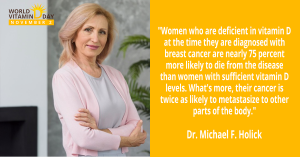World Vitamin D Day – November 2nd
 TORONTO, ON (October 26, 2023)— Health authorities worldwide now acknowledge that sun-care advisories in the future should not be one-size-fits-all and that darker-skinned people in sun-deprived climates like Canada may not be getting enough sun and vitamin D.
TORONTO, ON (October 26, 2023)— Health authorities worldwide now acknowledge that sun-care advisories in the future should not be one-size-fits-all and that darker-skinned people in sun-deprived climates like Canada may not be getting enough sun and vitamin D.
That’s an encouraging sign as The Vitamin D Society and Vitamin D authorities worldwide recognize November 2nd as the 15th annual World Vitamin D Day. In Canada, as much as 93 percent of the population is vitamin D deficient mainly due to lack of sun exposure.
“The Vitamin D Society has been educating people about the benefits of sunshine and vitamin D and celebrating World Vitamin D Day on November 2nd for the past 15 years. It’s amazing to see that acceptance of responsible sun-care messaging that acknowledges not only the benefits of non-burning sun, but the risks of over-stated sun-avoidance is catching on,” Vitamin D Society Executive Director Perry Holman said today.
Holman’s words come on the tail of:
- A new position statement on sensible sun published and endorsed by multiple organizations in Australia earlier this year promoting recommendations that balanced the harms as well as the benefits of sun exposure while recognizing the diversity of Australia’s population. That recommendation encouraged darker-skinned individuals to seek regular sun to prevent vitamin D deficiency, and for people of all skin types to get some sun in non-burning doses.
- A World Health Organization webinar in 2022 – Striking a balance: harms and benefits of sun exposure, reached a similar conclusion.
“The world is catching on that – especially in climates like most of Canada where sunlight is not strong enough between October and April to make vitamin D outdoors – getting sun in non-burning doses is important. The message is coming back to center.”
For more information on World Vitamin D Day on November 2nd, please visit our website and help take action to STOP vitamin D deficiency. Please consider sharing one of our graphics from the Tools section on your social media on November 2nd. Thank you!
Please help STOP Vitamin D Deficiency!
Take action to make sure you are not vitamin D deficient:
- Adults need a daily vitamin D intake of 4,000 IU/day (100 mcg) from all sources, according to levels recommended by vitamin D experts.
- Get out in the natural sunlight when the UV Index is above 3 and your shadow is shorter than your height. Remember to never sunburn.
- Consider artificial UVB exposure when natural sunlight is weak or not available and your skin type can receive UV exposure without burning.
- Increase your food intake of fatty fish such as salmon.
- Take a vitamin D3 supplement to make up the balance when sun exposure is not available or a viable option. UVB from sunlight or a sunlamp is what makes vitamin D naturally in your skin.
- Test and make sure your 25(OH)D blood level is between 100-150 nmol/L (Canada) or 40-60 ng/ml (USA). (home-based test)
About the Vitamin D Society:
The Vitamin D Society is a Canadian non-profit group organized to increase awareness of the many health conditions strongly linked to vitamin D deficiency; encourage people to be proactive in protecting their health and have their vitamin D levels tested annually; and help fund valuable vitamin D research. The Vitamin D Society recommends people achieve and maintain optimal 25(OH)D blood levels between 100 – 150 nmol/L (Can) or 40-60 ng/ml (USA).
To learn more about vitamin D, please visit www.vitamindsociety.org
-30-
For more information, please contact: Perry Holman, Vitamin D Society, [email protected]
Are You Getting Enough Vitamin D? Check Now!
Make Sure You Are Getting Enough of the Right Nutrients
Create your custom home blood spot kit to help determine if you are getting enough of the following nutrients shown to benefit overall health, along with other measures, including:
 Vitamin D
Vitamin D- Omega-3 Index plus AA:EPA Ratio
- Magnesium (plus Zinc, Copper, Selenium, Lead, Cadmium & Mercury)
- hsCRP
- HbA1c
- Type 1 Diabetes Autoantibodies
- TSH
Enroll and test your levels today, learn what steps to take to improve your status of omega-3s, vitamin D and other nutrients and blood markers, and take action! By enrolling in the GrassrootsHealth projects, you are not only contributing valuable information to everyone, you are also gaining knowledge about how you could improve your own health through measuring and tracking your nutrient status, and educating yourself on how to improve it.


 Vitamin D
Vitamin D